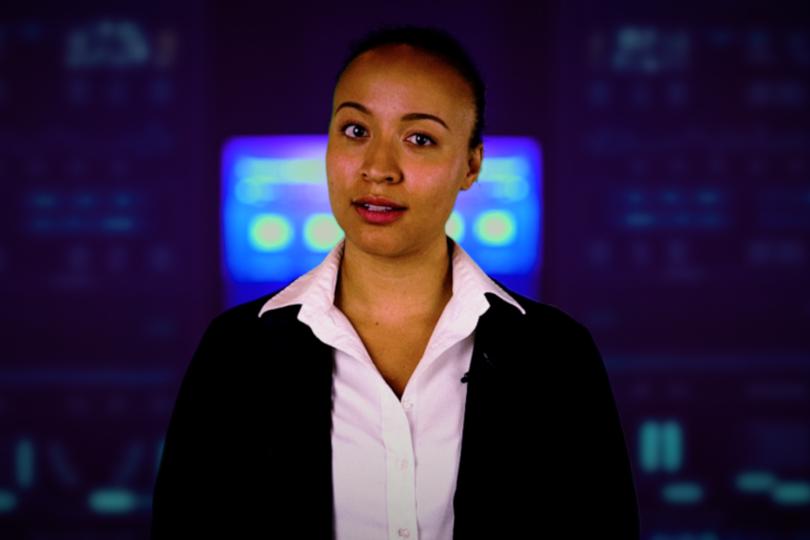Reboot Rebooted

I have a love-hate relationship with interactive theatre; I dearly love to hate it. In my experience, interactive theatre is either college kids in a basement using it as an excuse to harass their audience (a la SNL’s “High School Theatre Show”) or a frustrating hodgepodge of disjointed nonsense that relies heavily on both dirty and inside jokes. Luckily, Walking Shadow’s Reboot is neither.
Walking Shadow’s website describes Reboot as an “interactive hybrid of theater and escape room.” This seems fairly accurate, though I would lean more heavily toward the “escape room” side of the spectrum, with a crossbeam of sci-fi A.I. nerdiness. I have never been to an escape room, mostly because I have both anxiety and control issues (and would like to still have friends afterward). I’m also not a huge fan of sci-fi. You would think this would make me the worst possible reviewer for this type of production.
You might be right, but let’s press on.
After purchasing my ticket, I received a very long email from Walking Shadow that included information about technical requirements and rules of engagement for the virtual production, plus an entertaining pre-show video introducing the player to a charming humanoid robot named Bernice (voiced by Suzie Juul). I was immediately impressed by Bernice’s animation, and hopeful I would continue to be astounded with Walking Shadow’s technical aptitude once the show began (spoiler alert: I was).
I attended the opening night of Reboot with six other members of the human race. Based on the requirement that any attending human must log on with their own computer, I was unable to determine if any of the other players knew each other; I just knew that I didn’t know anyone. Agent Halo (the always-engaging Jamila Joiner) took roll and welcomed us into her universe, almost immediately giving us a quick puzzle so we could unlock the door to a restricted area. This puzzle was clearly intended to force the players to practice working together as a team, as it was impossible to complete the puzzle individually. Once we solved the puzzle, we busted down the door (carefully) and entered the restricted area.
It wasn’t until the second puzzle presented itself that I realized how horribly outclassed I was by my fellow players. We were presented with a number of documents left behind by two scientists (Charla Marie Bailey and Ari Hoptman), and asked to decipher their computer passwords. I wasn’t three lines into the first document before one of my fellow humans shouted out the first answer. Startled, I returned to the document until a second human shouted out the second answer about fifteen seconds later. We had beaten the puzzle, but I was thoroughly befuddled as to how (and still am, to be frank).
Our team’s capabilities continued in this manner for much of the production. While I consider myself intelligent and clever, I’m a kinesthetic and tactile person; I learn by picking things up and, in many cases, dropping them on the floor and accidentally breaking them. I found myself getting frustrated that I wasn’t helping the team as much as I wanted to (remember those control issues I mentioned earlier?), and as much as I was intrigued by the story, I couldn’t shake the feeling that I was little more than dead weight.
I was disappointed when the production wrapped, and I couldn’t quite pinpoint why. That it was over so soon (mine ran just under 90 minutes)? Perhaps. I was enjoying myself. But more likely, I was disappointed that I found the story more lacking than I would have liked. I am a great admirer of Derek “Duck” Washington’s work, and I have no doubt that crafting a compelling story with very few actors while also leaving room for puzzles and allowing for the human player variable is incredibly difficult. But – without spoiling too much of the story – I wanted it to dig deeper. I wanted it to go darker. I wanted to leave conflicted and convicted about morality instead of wondering if I still had taco meat left for dinner. Again, this is not to take anything away from Washington – as a playwright myself, I would never dream of tackling anything this complicated. But it wasn’t quite as fulfilling as I was hoping it would be.
What was not lacking in the slightest was the technical aptitude; the set design was era-appropriate and engaging, the 1980s-era computers seemed real, and the aforementioned Bernice was charming and I found myself wishing I could have her in figurine form. The only technical issues I noticed during the production were due to one of my fellow players having low bandwidth; the rest of the stream ran very smoothly, even with the visual effects on GOL3M VIII (Gregory Parks). Check out the virtual program on Walking Shadow’s website to learn more about their stellar production team.
Walking Shadow has produced numerous shows like Reboot, so they clearly have an audience willing to take the ride with them. However, I have no doubt that the show’s complex technical requirements would be a deterrent or barrier to some attendees. Players need a desktop or laptop computer in addition to a phone, a fast and stable internet connection, and a recommended second monitor in order to experience the show fully. That, plus the overwhelming ticket price (recommended $60, though tickets may be purchased for as low as $30) eliminates both players who are less tech-savvy, and players who may not have the funds to join the game. While I’m excited to see actors being paid well for their work, it does make me curious who the target audience is for this type of production and ticket tier.
Ultimately, I would recommend this production for anyone who enjoys escape rooms, likes sci-fi, or is bored of conventional theatre and wants to try something new. Your experience will vary based on the other players signed up for your slot, so I recommend collecting a group of your favorite humans and signing up for an evening together. There is enough player interaction to feel like you’ve accomplished something, and while I’m not certain any group could change the outcome of the show, you’d certainly have a lot to discuss afterward.
While this production wasn’t quite a fit for me, I do have to give Walking Shadow a few parting kudos. First, to Joiner and Parks for balancing the scripted elements and improvisation with such grace and skill. Joiner was proficient at giving the group good direction without ever leading us to the answer, and Parks was a warm, comforting presence that our group welcomed immediately. Second, kudos must be given for this show even existing. I like traditional theatre. I write traditional theatre. But traditional theatre is not for everyone, especially in times where gathering in-person is discouraged. Even though it wasn’t for me, I’m glad shows like this exist. I’m glad that theatre is no longer confined to sitting in a quiet room and watching people perform. I’m glad that we live in a metro where theatre companies take big risks and welcome new kinds of people into the theatrical sphere. If this is the future of theatre, I’m here for it. I’m listening.




